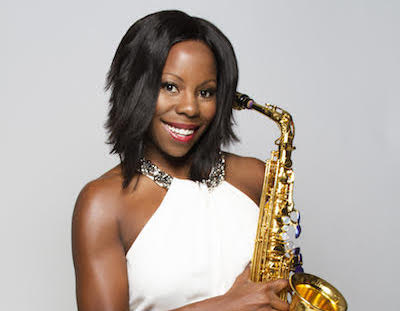Jan 13, 2026 2:09 PM
More Trump-Kennedy Center Cancellations
The fallout from the renaming of the John F. Kennedy Center for the Performing Arts to include President Donald…

Tia Fuller performed at the Dominican Republic Jazz Festival on Nov. 10.
(Photo: Courtesy of the artist)For its 20th-anniversary edition, which took place Nov. 9–12, the Dominican Republic Jazz Festival, curated by Artistic Director Marco Pignataro from Berklee Global Jazz Institute, booked a program comprised entirely of female bandleaders. This was a major statement in a country where domestic violence claims the lives of hundreds of women per year.
In addition to their concerts, each artist—they included Esperanza Spalding, Terri Lyne Carrington, Geri Allen and Tia Fuller—was contractually obliged to conduct at least one workshop as well as classes with children in the under-funded public schools of the resort communities on the Dominican Republic’s north coast, where luxury hotels and gated private enclaves stand across the road from impoverished neighborhoods.
After opening night in Santo Domingo—the southern coastal city in which pianist Joanne Brackeen performed with a Berklee student ensemble called the Global Jazz Ambassadors—DRJF moved north to Santiago, where the proceedings transpired in a tented, open-air plaza behind the Centro León museum, which frequently hosts cultural activities.
The evening opened with a quintet led by recent BGJI graduate Lihi Haruvi, a young Israeli alto and soprano saxophonist, with pianist Caili O’Doherty, electric mandolinist Jacob Means, bassist Ehud Ettun and drummer Cory Cox. They performed a seven-piece program comprised of four Haruvi-arranged songs composed or popularized by Israeli women, as well as three of Haruvi’s tunes.
Haruvi clapped her hands as she assumed the bandstand. Her bandmates followed suit, then started the Balkan-sounding theme of Haruvi’s “Hamsa Hamsa,” titled, the composer explained, to acknowledge both hamsa’s Arabic meaning as the number 5 (represented by the double-grouping of 5 quarter notes in the first section), but also to denote the expression’s frequent Israeli usage as “good luck.”
Means mirrored Haruvi’s soprano saxophone melody statement, then the flow morphed to a rubato space, defined by O’Doherty’s Robert Glasper-esque melodies over Cox’s Damion Reid-like drum chants. Means skronked out; Haruvi returned for a forceful improvisation, concluding with an extravagant coda.
There followed “You Took My Hand In Yours,” by Matti Caspi. Haruvi, now on alto saxophone, stated the theme, which included a section vaguely reminiscent of Horace Silver’s “Song For My Father” and another that evoked Russian folk music. O’Doherty uncorked a swinging, thematically cohesive solo, devoid of clichés, that illuminated the song’s soulfulness. Haruvi wove together motivic fragments into a unitary quilt, blowing hard throughout.
Cox’s dark-toned, mallet solo and Ettun’s upper register bass variations introduced Mordechai Zeira’s “Two Roses,” whose many interpreters, Haruvi said, include “Queen Of Hebrew Music” Shoshana Damari.
Haruvi’s alto saxophone stated the stark, mysterious theme. (The song portrays a white rose and a red rose that grew and bloomed together until one rose was picked by hand, breaking the heart of the rose left behind.) She switched to soprano sax for a passionate improvisation. O’Doherty dug into the melody with bell-like tone, and Ettun soloed to his own vocal accompaniment, before Haruvi returned, first stating the theme with delicacy, then ratcheting up the intensity for a praiseful ending.
Haruvi navigated the bittersweet refrain of Zeira’s “There Were Nights” with pointillistic focus. The song’s subject is tragic—a woman reminiscing about a dead lover—but Haruvi projected an affirmative attitude in a forceful alto-drums duo with Cox in which she coalesced fragmentary phrases into long, wild lines, before a backbeat-fueled finale.
On “Interlude,” an original tune, Haruvi moved from a rubato treatment of the melody to whirlwind velocity, then returned to a ruminative mood that O’Doherty picked up as Cox countered with double-time beats.
Haruvi explored extended techniques with klezmer intensity before resolving—perhaps a bit self-consciously—into a swinging passage. O’Doherty reaffirmed the swing with a bluesy solo, at one point quoting “Softly As In A Morning Sunrise.” Haruvi resumed with swoops that matched the mandolin’s tonality, then, on her final go-through, fragmented the theme into different shapes.
A highlight of “Right Now It Doesn’t Seem Too Good,” by Chava Alberstein, was O’Doherty’s refraction of Chick Corea in yet another swinging solo; Haruvi ended this well-played set with the funky “All The People In The World,” which began with a theme that held connotations of “Jean-Pierre,” transitioned to a playful bebop line, and ended as a soulful blues

Belá Fleck during an interview with Fredrika Whitfield on CNN.
Jan 13, 2026 2:09 PM
The fallout from the renaming of the John F. Kennedy Center for the Performing Arts to include President Donald…

Peplowski first came to prominence in legacy swing bands, including the final iteration of the Benny Goodman Orchestra, before beginning a solo career in the late 1980s.
Feb 3, 2026 12:10 AM
Ken Peplowski, a clarinetist and tenor saxophonist who straddled the worlds of traditional and modern jazz, died Feb. 2…

The success of Oregon’s first album, 1971’s Music Of Another Present Era, allowed Towner to establish a solo career.
Jan 19, 2026 5:02 PM
Ralph Towner, a guitarist and composer who blended multiple genres, including jazz — and throughout them all remained…

Rico’s Anti-Microbial Instrument Swab
Jan 19, 2026 2:48 PM
With this year’s NAMM Show right around the corner, we can look forward to plenty of new and innovative instruments…

Richie Beirach was particularly renowned for his approach to chromatic harmony, which he used to improvise reharmonizations of originals and standards.
Jan 27, 2026 11:19 AM
Richie Beirach, a pianist and composer who channeled a knowledge of modern classical music into his jazz practice,…